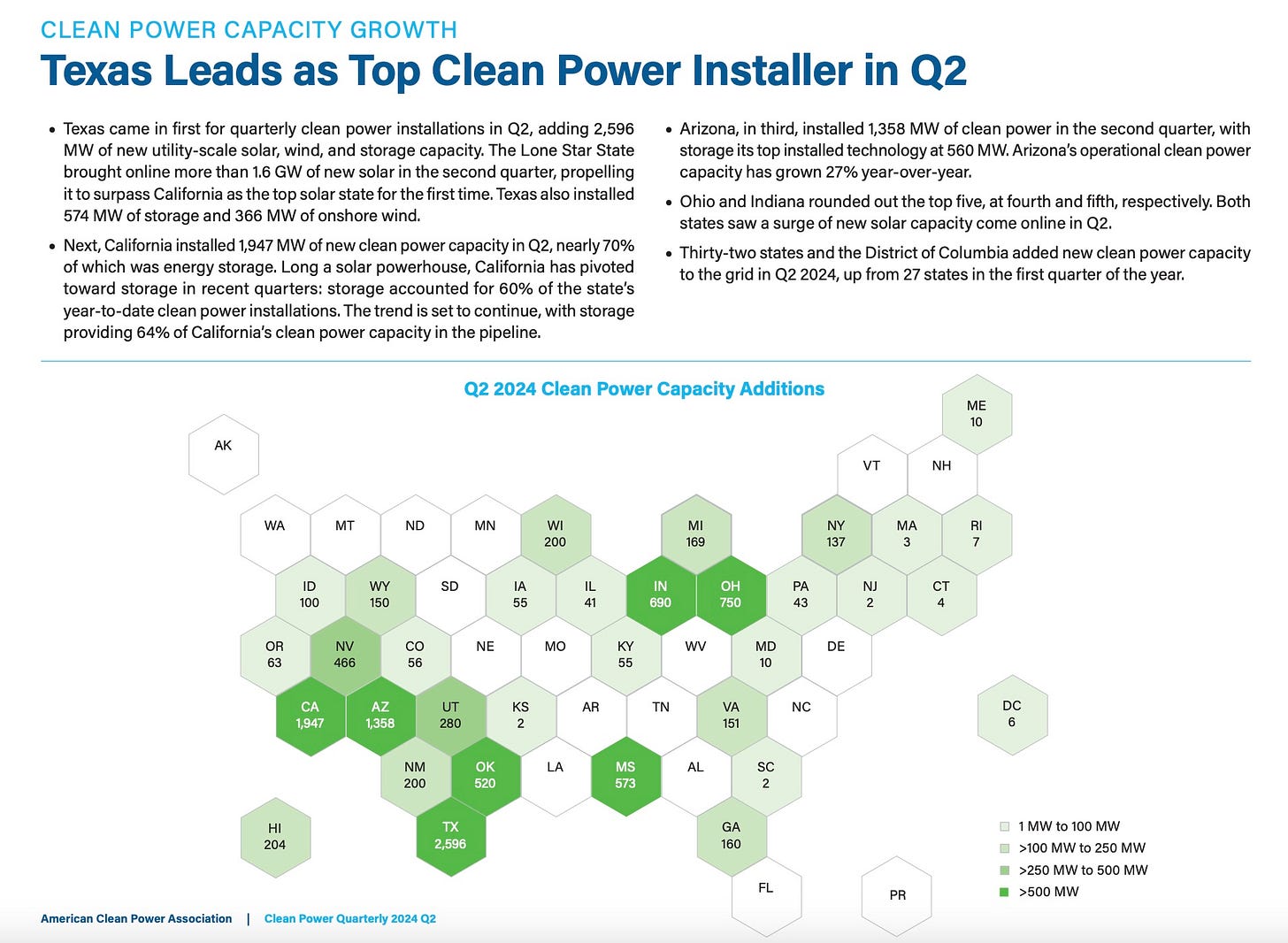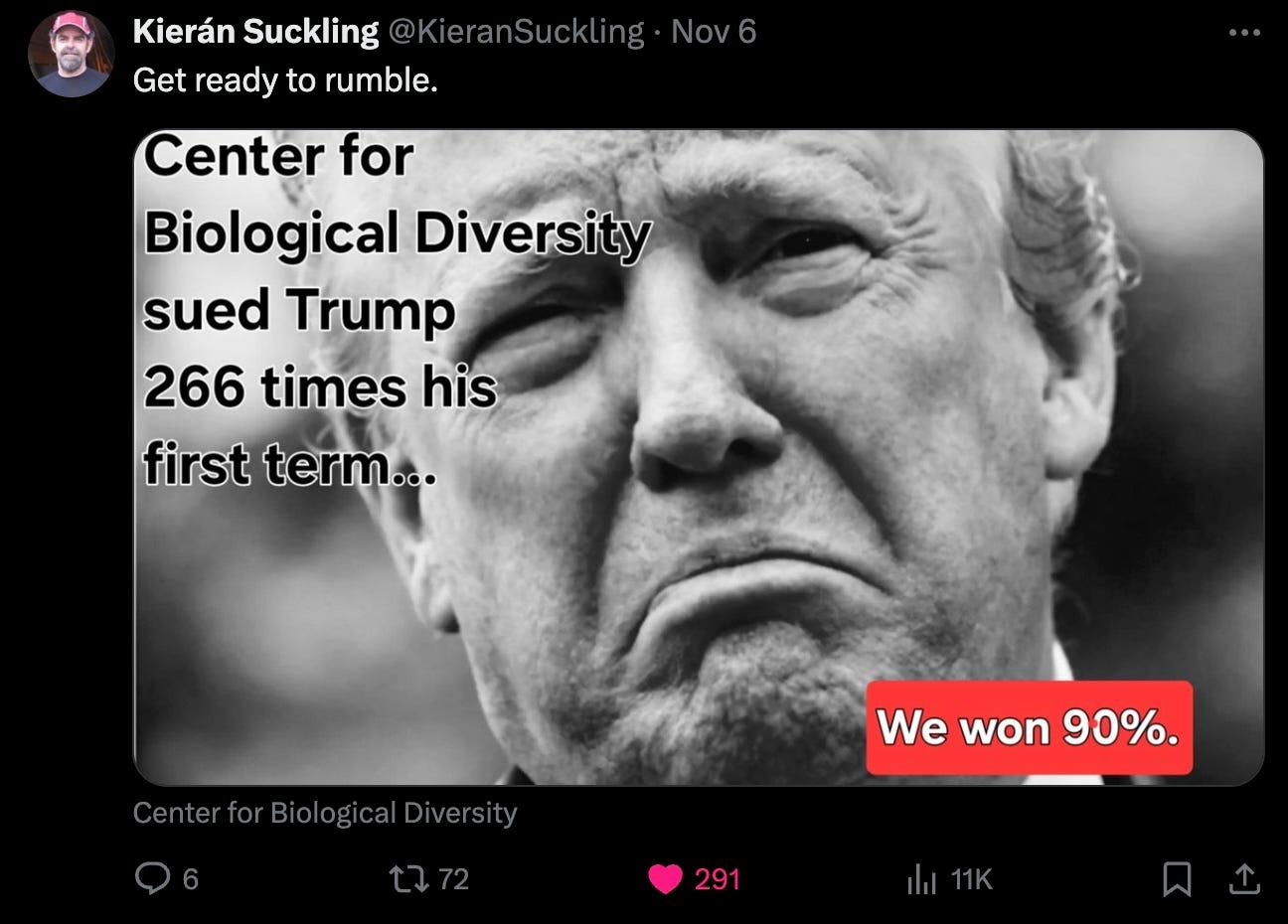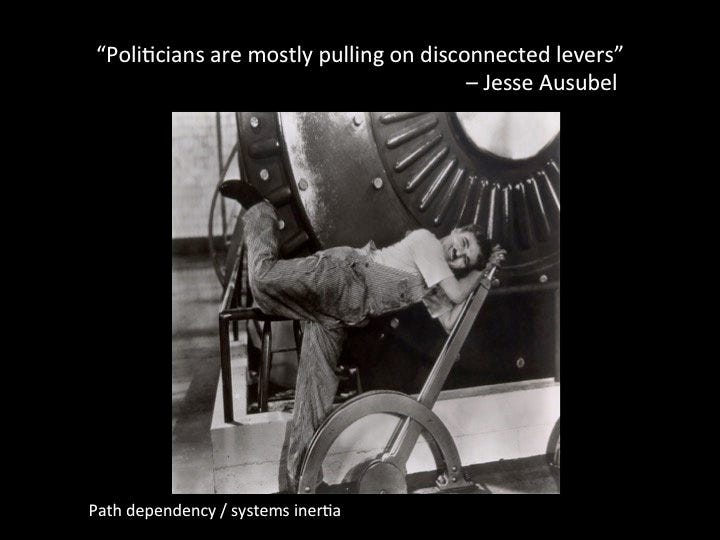Looking for Lessons from 8 Years Ago, When Some Climate-Focused Friends and I Considered What Trump 1.0 Portended
It's Worth Looking Back to Plan Ahead
For the record, in weighing the risks posed by Trump’s second presidency, I’m far more worried about the societal impacts (mass deportation, abortion risk, education systems…) and geopolitical impacts (Ukraine’s and Gaza’s fate) than environmental impacts - including on climate and clean-energy trends. Consider that red states lead in renewable-energy deployment as a first step to remembering the momentum out there.
But a second Trump administration, as I laid out for the Bulletin of the Atomic Scientists a few days ago, will sadly threaten to undo many gains made under Joe Biden on climate and clean energy policy. It’s great that the lawyers at the Center for Biology Diversity are “ready to rumble,” as the group’s leader Kieran Suckling tweeted on November 6, but Trump’s team has a lot more sympathetic federal judges now and is assembling a loyalist-dominated administration to drive his fossil-centered agenda.
There’ll be much more to say about this in the weeks and months ahead, including on how Trump’s reported loyalty-oath requirement for cabinet members and armies of political appointees (loyalty to the man more than the Constitution) will fill this administration with hyper partisanship.
A few days ago I spoke with someone I assumed would be a top contender to head the Energy Department or serve as science adviser in Trump’s White House. I can’ t name him at the moment because we were e-chatting on background, but he said:
Expect I’d fail the loyalty requirement allegedly being imposed on appointments, as scientific facts are sometimes at odds with political goals. Better to be an external adviser.
As a starting point for this journey, I thought it’d be worth reposting two things - an anxious but determined climate conversation I participated in on the Warm Regards podcast eight years ago, just hours after Trump defeated Hillary Clinton, and a simultaneous Dot Earth post examining prospects for the environment and climate under Trump.
I’ve opened comments to all subscribers. I’m looking back at my views the first time to be sure I don’t repeat mistakes.
Warm Regards was the brainchild of the then-hyper-online meteorologist Eric Holthaus. He’d sent around an email plea trying to convince a range of climate communicators to convene and converse regularly. The University of Maine climate researcher Jacquelyn Gill and I partnered up with him in this experiment at the time, and
took on the production side. Have a listen. Here’s a rough transcript if you’d prefer to sift and read.Here’s the Dot Earth post. What did I get wrong then? What will be worse now? (I hinted at why things will be worse in that Bulletin piece).
Prospects for the Climate, and Environmentalism, Under President Trump
Get used to the sound of that, my environment-oriented friends.
Is this end times for environmental progress or, more specifically, climate progress?
No.
The bad news about climate change is, in a way, the good news:
The main forces determining emission levels of heat-trapping carbon dioxide will be just as much out of President Trump’s hands as they were out of President Obama’s. The decline in the United States has mainly been due to market forces shifting electricity generation from coal to abundant and cheaper natural gas, along with environmental regulations built around the traditional basket of pollutants that even conservatives agreed were worth restricting. (Efficiency and gas-mileage standards and other factors have helped, too, of course.)
AR - This is clearer than ever, both domestically, as I explained at the top of this post, and internationally. “We’re not going back,” on coal for sure. In October, the International Energy Agency said, “demand for all three fossil fuels – coal, oil and gas – is still projected to peak by the end of the decade.”]
At the same time, the unrelenting rise in greenhouse-gas emissions in developing countries is propelled by an unbending reality identified way back in 2005 by British Prime Minister Tony Blair, when he said, “The blunt truth about the politics of climate change is that no country will want to sacrifice its economy in order to meet this challenge.”
At the same time, as well, other fundamental forces will continue to drive polluted China and smog-choked India to move away from unfettered coal combustion as a path to progress. An expanding middle class is already demanding cleaner air and sustainable transportation choices — just as similar forces enabled pollution cleanups in the United States in the last century.
That’s why the Paris Agreement on climate change will continue to register progress on emissions and investments in clean energy or climate resilience, but only within the limits of what nations already consider achievable (as others will be explaining in detail because the first post-Paris round of negotiations is under way right now in Marrakech).
[AR- COP 29 is set to start on Monday in Azerbaijan, a petrostate if there ever was one, reflecting the longstanding reality that fossil fuels are a part of the global energy mix for decades to come. Keep in mind it’s fair to call the United States a petrostate as well, as some have recently noted.]
Long ago, Jesse Ausubel, a veteran Rockefeller University analyst of global resource and environmental trends, asserted that, “in general, politicians are pulling on disconnected levers” at the intersection of energy and environmental policy.
As I wrote in 2014, that doesn’t mean environmental agendas by politicians are useless, and environmentalism remains vital as a result. But what approach is most workable, particularly under a Trump administration with Congress in Republican control?
Is it end times for 20th-century-style us-them environmentalism?
That’s up to the movement. One response to a Trump presidency will be to double down with more pipeline blockades and other efforts to “keep it [carbon] in the ground.”
I’m not saying there’s no utility there. As I wrote on Monday, the Dakota Access Pipeline actions have brought much-needed attention to some longstanding grievances of Native Americans, including the diversion of environmental risks from the neighborhoods of more empowered constituencies onto Sioux lands and waterways. And revealing, and pressing, the banks financing the pipeline project is great.
But timing matters. Thinking ahead, for example, to the next congressional race, in 2018, I’d recommend avoiding the tactics used by those who tried to make the Standing Rock action as much about climate and carbon as Native American justice. With that in mind, I think it’s worth including a section I cut from my Monday post — a section I held off running at the time following Mark Twain’s dictum about the value of “unsent letters.”
The section dealt with Bill McKibben’s message in an Op-Ed article in The Times explaining “Why Dakota is the New Keystone.” I felt it was a mistake for McKibben (an old friend from decades spent in parallel, but divergent, tracks on climate change) and others to make this a green litmus test for Hillary Clinton:
“In the final hours of an incredibly consequential presidential race in which every vote — centrist or liberal — will play an important role, I was discouraged to see him use this moment to criticize Hillary Clinton’s campaign for “ugly silence” in not jumping to the ramparts on this. Is there any logic to this at the end of an extraordinarily divisive campaign in which polls are tightening? Let me know if you see it.
“Late last week, the pressure from the left did elicit a response from the Clinton campaign, which was predictably, and woefully, parsed, as Evelyn Nieves describes in The Nation today.
“Is forcing that statement a victory? Should this have been made an Election Day issue? I guess we’ll find out.
We just found out.”
Of course Clinton’s defeat was a devastating political death of a thousand cuts — many self inflicted, others not. But this strategy of the green left was surely in the mix because it negated real concerns of working people facing economic uncertainty.
Obama recognized the importance of taking such concerns into account in hist great “South By South Lawn” climate conversation with the scientist Katharine Hayhoe and the actor and activist Leonardo DiCaprio:
“I think it is important for those of us who care deeply about this — and Katharine is a wonderful example of the right way to do it — to not be dismissive of people’s concerns when it comes to what will this mean for me and my family. Right?
“So if you’re a working-class family, and dad has to drive 50 miles to get to his job, and he can’t afford to buy a Tesla or a Prius, and the most important thing to him economically to make sure he can pay the bills at the end of the month is the price of gas, and when gas prices are low that means an extra 100 bucks in his pocket, or 200 bucks in his pocket, and that may make the difference about whether or not he can buy enough food for his kids — if you just start lecturing him about climate change and what’s going to happen to the planet 50 years from now, it’s just not going to register.”
[ AR - Here’s the video of that moment on the White House South Lawn:]
So what do environment-minded citizens, including journalists, do next?
There’s plenty to do, much of which is continuing lines of effort that are already under way — as with communities and organizations and media identifying a host of problems, from Volkswagen’s cheating to continuing leakage of methane from “super-emitter” sources in our oil and gas infrastructure.
I’ll be trying to do what I’ve done for a very long time — hold people in power accountable for actions or inactions that can result in harm or betterment. There are green glimmers amid the most polarizing sound bites of the Trump campaign. One came in his responses to the questions posed by the Science Debate organization:
“Perhaps we should be focused on developing energy sources and power production that alleviates the need for dependence on fossil fuels.”
That’s a statement I plan to hold him accountable on. I wrote on it in my piece on Trump’s choice to run the transition at the Environmental Protection Agency — Myron Ebell of the Competitive Enterprise Institute.
Last night, I sent Ebell a note asking for his new contact information. I’ll be getting in touch as soon as he’s up and running.
Here’s another answer Trump’s team provided to the Science Debate folks:
“[T]he federal government should encourage innovation in the areas of space exploration and investment in research and development across the broad landscape of academia. Though there are increasing demands to curtail spending and to balance the federal budget, we must make the commitment to invest in science, engineering, healthcare and other areas that will make the lives of Americans better, safer and more prosperous.”
I’ll be keeping track on that front, as well, given the critical role invigorated basic research will have in accelerating a transition from the fuels of convenience to clean-energy choices that can work not only here, but everywhere.









Many workers, families and communities will be negatively impacted by implementation of climate and biodiversity solutions. Workers, families and communities supported by fossil fuel companies, gas and diesel vehicles, beef, dairy and corn-based ethanol production are examples. These workers, families and communities are threatened by the transition to renewable energy, plant-based diets and less luxury spending on international travel, private jets and yachts. Climate solutions must be paired with realistic and generous just transition solutions, or the politics is not winnable. Just transition solutions cannot be a nebulous after-thought.
I feel like there's a lot of people who want to burn it all down right now. Some people want to burn it down for the right reasons, some of them the wrong ones. I personally have moments of that too. But that's what Americans wanted and they picked the guy with gasoline and a match.
The collateral burn damage will still be terrible.
That said, there are people in my very liberal location that loathe the bus/bike lanes as they sit in traffic. I was comparing an electric bill from Oct 2022 to the current one--with the same exact kWh--the bill was $40 more. This is despite being on our "community choice" electric plan that is supposed to insulate us and be more green. And the extra fees actually list things such as "distributed solar charge" + "renewable energy charge" + "energy efficiency charge" + "electric vehicle program". I have seen many snide comments from people who dislike these things and blame them for their costs rising. And let's not forget that Sierra Club worked against the hydro line in Maine, which we just saw in the headlines last week will cost us: "Mass. ratepayers to pay $521m more for hydroelectricity because of Maine political delays".
I still support all these things, and think they are important as we face climate change. But they are at the same time under the skin of a lot of regular folks and adding to their desire to light the match.